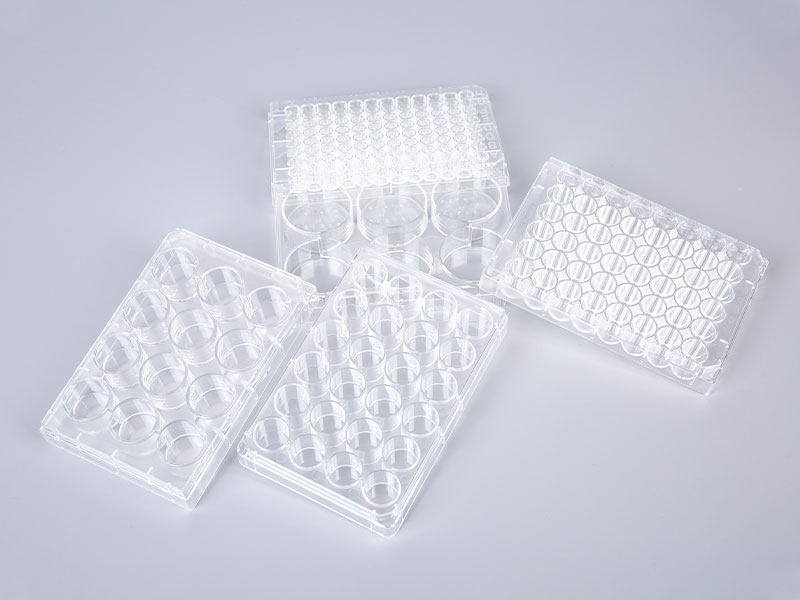Exploring the Impact of Cell Culture Plate Materials on Cell Growth and Compatibility
In cell culture experiments, the choice of cell culture plates plays a crucial role in determining the success of cell growth and the reliability of experimental results. One of the most important factors in this decision is the material used in the construction of the plates, as it directly influences cell adhesion, proliferation, and compatibility with various cell types. While multiple features contribute to the effectiveness of these plates, the base material is fundamental to their performance, especially for adherent cells that require a supportive surface to anchor themselves.
Most modern cell culture plates, including Bioland’s TC-treated adherent plates, are made from composite USP Class VI medical-grade polystyrene. This type of polystyrene is particularly valued for its excellent optical clarity, chemical stability, and biocompatibility, making it ideal for microscopy, imaging, and other analytical techniques. The material’s smooth, uniform surface provides a consistent platform for cells to attach, ensuring that variations in cell growth are minimized across different wells. Moreover, it is inert and non-reactive, reducing the risk of any unintended chemical interactions that could affect the culture media or the cells themselves.
The surface treatment of these plates is another critical element, especially for adherent cells. Tissue culture (TC) treatment is a standard process applied to the surface of polystyrene plates to enhance cell adhesion. During this process, the surface undergoes oxidation, which introduces functional groups that make the surface hydrophilic and more conducive to cell attachment. This is essential for cells such as fibroblasts, epithelial cells, or other anchorage-dependent lines that require a firm base for growth. By increasing surface wettability, TC treatment creates a more favorable environment for the cells, leading to more efficient adhesion and promoting healthy cell morphology and function.

Different cell types, however, may have varying preferences for surface characteristics. Some delicate or specialized cells, such as stem cells or neuronal cultures, may benefit from additional surface coatings, such as collagen, fibronectin, or other extracellular matrix proteins. These coatings provide biological signals that mimic the natural environment of the cells, encouraging them to adhere, spread, and differentiate in ways that standard polystyrene surfaces may not achieve. Understanding the specific needs of the cells being cultured can help researchers select the most appropriate surface treatment or coating, ensuring optimal compatibility and results.
Beyond the material itself, design features of cell culture plates also contribute to their functionality. Bioland’s plates, for example, include innovations like low-volatility grooves around the wells to prevent excessive evaporation of the media, which can disrupt pH balance and osmolarity, leading to poor cell growth. The raised edges around the wells help prevent cross-contamination between samples, and the angled guides on the lids keep the wells sterile by preventing any mishandling or misplacement. All these details work together with the high-quality material to provide a reliable, user-friendly platform for cell culture work.
The compatibility of these plates with automated systems such as liquid handlers, plate readers, and imaging platforms further underscores the importance of material choice. Polystyrene’s durability and dimensional stability allow these plates to maintain their shape and integrity even when exposed to various temperatures, pressures, and mechanical forces in automated processes. This ensures that the data collected from high-throughput experiments remains accurate and reproducible, further emphasizing the value of well-constructed cell culture plates.
For more information, please call us at +86-0571-87993109 or email us at hzbioland@126.com.
Aseptic vacuum filters, like Bioland™ disposable vacuum filtration units, are designed for high-effi...
Whether used in the food hygiene industry, water monitoring, or research labs, selecting the right m...
Narrow-mouth reagent bottles are essential tools in laboratories, offering precise storage solutions...
In laboratory diagnostics, particularly in PCR (Polymerase Chain Reaction) testing, efficiency is pa...
When working with the Bioland™ Cell Shaker, one of the most crucial factors in ensuring successful c...
Polymerase chain reaction (PCR) is one of the most vital techniques in molecular biology, allowing s...

 中文简体
中文简体 English
English Español
Español русский
русский











